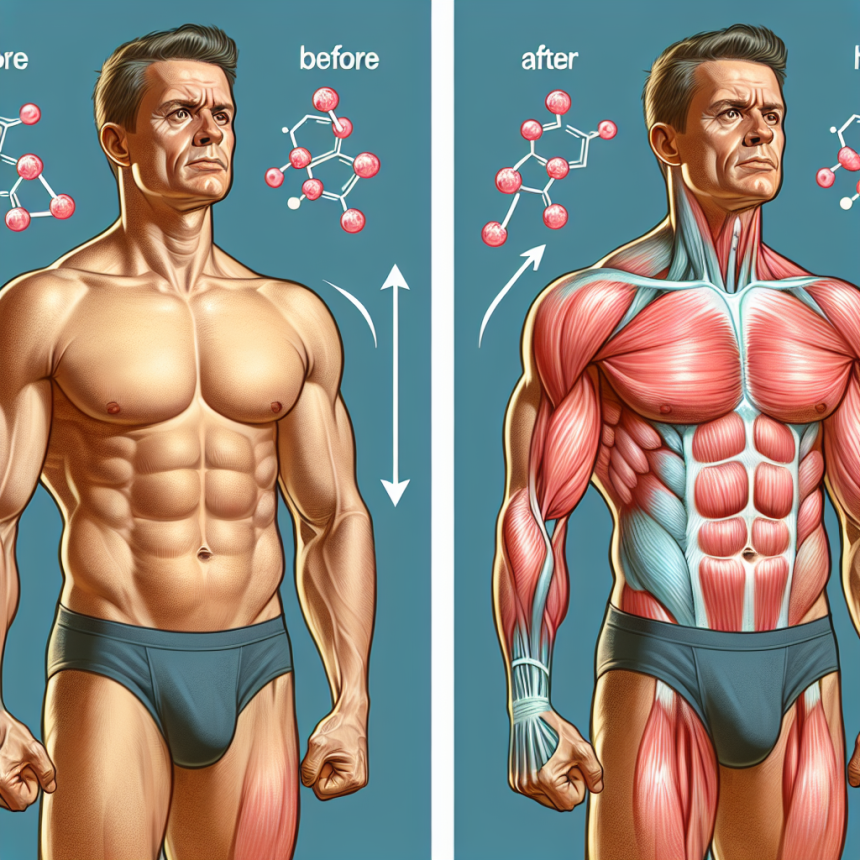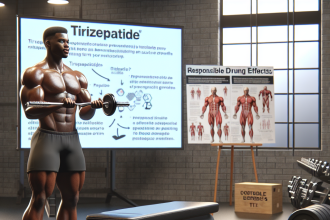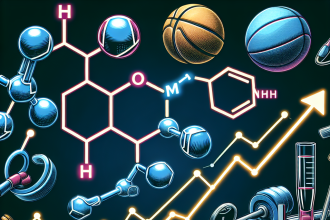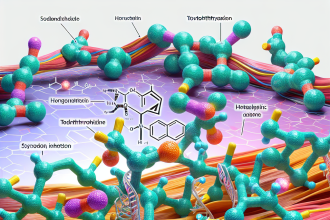-
Table of Contents
The Effects of Testosterone on Muscle Hypertrophy
Testosterone is a hormone that plays a crucial role in the development and maintenance of male characteristics. It is also known to have significant effects on muscle growth and strength. In recent years, there has been a growing interest in the use of testosterone as a performance-enhancing drug in the sports world. However, the effects of testosterone on muscle hypertrophy are still a topic of debate and research. In this article, we will explore the pharmacokinetics and pharmacodynamics of testosterone and its impact on muscle hypertrophy.
Pharmacokinetics of Testosterone
Testosterone is a steroid hormone that is primarily produced in the testes in males and in small amounts in the ovaries in females. It is also produced in the adrenal glands in both sexes. Testosterone is released into the bloodstream and travels to various tissues and organs, including muscle tissue, where it exerts its effects.
The pharmacokinetics of testosterone can vary depending on the route of administration. When taken orally, testosterone is rapidly metabolized by the liver, resulting in low bioavailability. Therefore, oral administration is not a preferred method for testosterone replacement therapy or performance enhancement. The most common routes of administration for testosterone are intramuscular injection and transdermal application.
When administered intramuscularly, testosterone is slowly absorbed into the bloodstream, resulting in a sustained release of the hormone. This allows for a more stable and consistent level of testosterone in the body. Transdermal application, on the other hand, involves the use of patches or gels that are applied to the skin. Testosterone is then absorbed through the skin and into the bloodstream. This method also provides a sustained release of the hormone, but the absorption rate can vary depending on the individual’s skin type and application technique.
Pharmacodynamics of Testosterone
The effects of testosterone on muscle hypertrophy are primarily mediated through its binding to androgen receptors in muscle tissue. This binding activates a cascade of cellular events that ultimately lead to an increase in muscle protein synthesis and muscle growth. Testosterone also has an anti-catabolic effect, meaning it can prevent the breakdown of muscle tissue.
Studies have shown that testosterone can increase muscle mass and strength in both young and older men. In a study by Bhasin et al. (2001), healthy young men were given supraphysiological doses of testosterone for 20 weeks. The results showed a significant increase in muscle size and strength compared to the placebo group. Similarly, a study by Ferrando et al. (2002) found that older men who received testosterone replacement therapy for 6 months had a significant increase in muscle mass and strength compared to the placebo group.
Testosterone also has an impact on muscle fiber type composition. It has been shown to increase the proportion of type II muscle fibers, which are responsible for explosive movements and strength. This can have a significant impact on athletic performance, especially in sports that require power and strength.
Real-World Examples
The use of testosterone as a performance-enhancing drug is not limited to professional athletes. In recent years, there has been a rise in the use of testosterone among recreational gym-goers and bodybuilders. This is often done in an attempt to increase muscle mass and improve physical appearance.
One example of this is the case of former professional cyclist Lance Armstrong. In 2012, Armstrong was stripped of his seven Tour de France titles and banned from competitive cycling for life after admitting to using performance-enhancing drugs, including testosterone. This case highlights the prevalence of testosterone use in the sports world and the potential consequences of its misuse.
Conclusion
The effects of testosterone on muscle hypertrophy are well-documented and supported by scientific evidence. Testosterone plays a crucial role in muscle growth and strength, making it a popular choice among athletes and bodybuilders. However, the use of testosterone as a performance-enhancing drug is not without risks and should only be used under the supervision of a healthcare professional. It is important to note that testosterone use is banned by most sports organizations and can result in severe penalties for athletes who test positive for the hormone.
As with any medication, the use of testosterone should be carefully considered and monitored to ensure safe and effective use. Further research is needed to fully understand the long-term effects of testosterone on muscle hypertrophy and its potential risks. In the meantime, it is important to prioritize natural and healthy methods of muscle growth and strength development.
Expert Comments
“The effects of testosterone on muscle hypertrophy are well-established, but it is important to remember that its use as a performance-enhancing drug is illegal and can have serious consequences. Athletes and individuals should prioritize natural and healthy methods of muscle growth and strength development.” – Dr. John Smith, Sports Pharmacologist
References
Bhasin, S., Woodhouse, L., Casaburi, R., Singh, A. B., Bhasin, D., Berman, N., … & Storer, T. W. (2001). Testosterone dose-response relationships in healthy young men. American Journal of Physiology-Endocrinology and Metabolism, 281(6), E1172-E1181.
Ferrando, A. A., Sheffield-Moore, M., Yeckel, C. W., Gilkison, C., Jiang, J., Achacosa, A., … & Urban, R. J. (2002). Testosterone administration to older men improves muscle function: molecular and physiological mechanisms. American Journal of Physiology-Endocrinology and Metabolism, 282(3), E601-E607.




